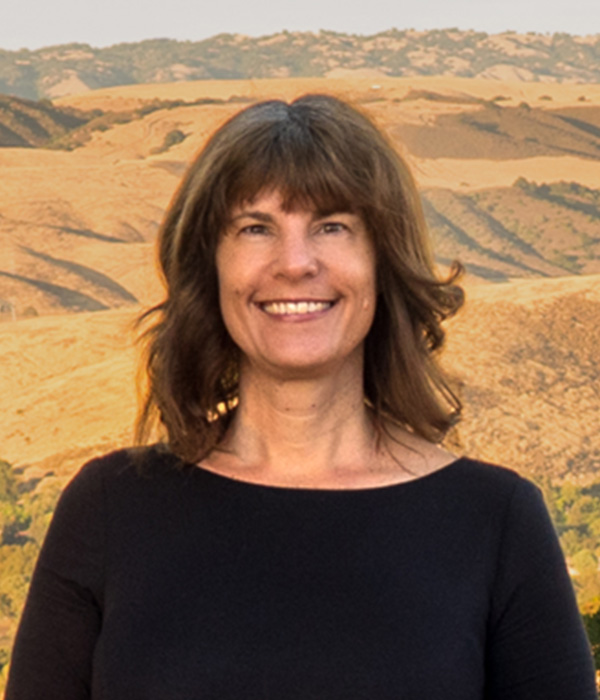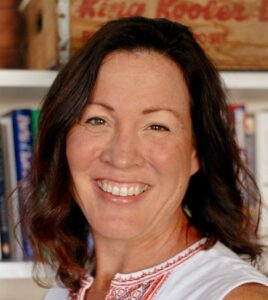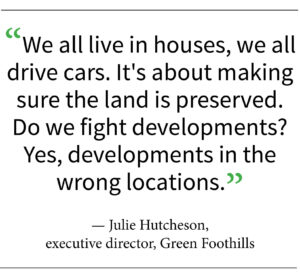As executive direct of Green Foothills, she strives to curb urban sprawl
![]()

Julie Hutcheson recently was made the executive director of Green Foothills.
By Kelly Barbazette

Kelly Barbazette
Fifteen years ago, Julie Hutcheson’s curiosity about land use planted the seed for her career in environmental advocacy, leading to her new role as executive director of Green Foothills.
A Morgan Hill resident, the 56-year-old woman has worked for Green Foothills for the past 13 years, helping in their efforts to create parks and nature preserves throughout Santa Clara and San Mateo counties.
“We have a very long and storied history,” she said. “As a result of the advocacy, it has led to the preservation of 200,000 acres in two counties.”
I recently had the pleasure of speaking to Hutcheson about how her passion for responsible growth and open space preservation grew out of her volunteerism in the early 2000s.
“The path I’m on, I couldn’t have imagined it 20 years ago,” Hutcheson said.
Born in Ottawa, Canada, she didn’t do the “direct route” to college. Instead, she worked multiple jobs to pay her way through school where she studied Russian and applied linguistics at Carleton University. Her father is Hungarian and escaped from Hungary in 1956 during the Hungarian Revolution. As a child, Hutcheson traveled to Hungary three times.
“I kind of understood that part of the world,” she said. “I’ve always loved Europe for its history.”
 She earned a master’s degree in Slavic linguistics from the University of Virginia after moving to Virginia with her boyfriend, now husband. The day after graduating in May 1994, she got married. She went onto work for the National Association of Regulatory Utility Commissioners, the group representing the U.S. state public service commissioners who regulate essential utility services, including energy, telecommunications, and water. Her first son was born in 2000 and the couple moved to Salinas six months later. They moved again in 2004 to Morgan Hill, a year after the arrival of their second son. This would be Hutcheson’s eleventh move in her lifetime. In 2008, she began seeking involvement in her community.
She earned a master’s degree in Slavic linguistics from the University of Virginia after moving to Virginia with her boyfriend, now husband. The day after graduating in May 1994, she got married. She went onto work for the National Association of Regulatory Utility Commissioners, the group representing the U.S. state public service commissioners who regulate essential utility services, including energy, telecommunications, and water. Her first son was born in 2000 and the couple moved to Salinas six months later. They moved again in 2004 to Morgan Hill, a year after the arrival of their second son. This would be Hutcheson’s eleventh move in her lifetime. In 2008, she began seeking involvement in her community.
“I started taking a look around,” she said. “I’ve had a general interest in environmental issues broadly and started talking to people.”
A friend invited her to a lunch hosted by a local environmental cohort. Soon after, she was introduced to a former principal planner for Santa Clara County and former Morgan Hill Mayor Dennis Kennedy. She began observing and questioning how land use decisions were being made.
“The more I learned I thought, I may not be the land use expert, but I can decipher this is not good land use planning,” she said.
She worked on the successful campaign for Measure A, which would allow 500 housing units to be built downtown while maintaining the city’s population cap. Voters approved the measure in 2009. She next co-founded Thrive! Morgan Hill, a community group focused on engaging the community in land usage and quality of life issues. She noticed a general absence of people in the community talking about projects before they were approved.
“There were a lot of nonprofits,” she said. “There was a lot of great work being done in the community, but that wasn’t being talked about.”
 While learning about the ecosystem of regional environmental nonprofit groups, Hutcheson met with the director of Green Foothills, a nonprofit group created in 1962 in Palo Alto. Dedicated to protecting open space, farmland, and natural resources in Santa Clara and San Mateo counties, it has worked collaboratively to preserve open space and create the Midpeninsula Regional Open Space District.
While learning about the ecosystem of regional environmental nonprofit groups, Hutcheson met with the director of Green Foothills, a nonprofit group created in 1962 in Palo Alto. Dedicated to protecting open space, farmland, and natural resources in Santa Clara and San Mateo counties, it has worked collaboratively to preserve open space and create the Midpeninsula Regional Open Space District.
Hutcheson began doing contract work for Green Foothills. In 2010, she was hired on as a staff member. For the past 13 years, she has taken an active role in helping secure support for the Santa Clara Valley Habitat Agency. It oversees a 50-year regional plan to protect endangered species and natural resources while allowing for future development in Santa Clara County, and the multi-year campaign to preserve Coyote Valley. Hutcheson said the “biodiversity hotspot” just north of Morgan Hill is one of the last remaining corridors for wildlife to migrate between the Santa Cruz Mountains and the Diablo Range. While Coyote Valley had been eyed for development since the 1970s, a grassroots effort led by local groups including Green Foothills helped to raise awareness about it.
“We had a really broad coalition. We were knocking door to door,” she said.
In 2021, the city of San Jose changed the land use designation of Coyote Valley from industrial to open space and agricultural, protecting more than 3,000 acres from future development.
“A lot of people have a bad impression that we’re just against development. It couldn’t be further from the truth,” Hutcheson said. “We all live in houses, we all drive cars. It’s about making sure the land is preserved. Do we fight developments? Yes, developments in the wrong locations.”
Green Foothills’ main concern is curbing sprawl, which she said is expensive to taxpayers who have to foot the bill for roads and increased services, and preserving farmland and endangered species habitats.
 “It makes great economic sense to build in a really responsible manner,” she said. “And in a world with climate change, it makes so much sense because the more we sprawl out the more auto centric we become.”
“It makes great economic sense to build in a really responsible manner,” she said. “And in a world with climate change, it makes so much sense because the more we sprawl out the more auto centric we become.”
Hutcheson finds her work incredibly rewarding because it’s contributing to the health of the environment and people’s quality of life.
“People benefit from it, but they may not see it,” she said. “But when you go out and enjoy the parks or an open space preserve, chances are we had something to do with it.”
While Green Foothills’ “bread and butter” has been advocacy, it launched a leadership program 10 years ago to grow a “more inclusive conservation movement.” The program, which meets monthly for eight months, trains emerging leaders who want to do environmental work in their communities. It has graduated 260 people from Santa Clara, San Benito, and San Mateo counties. This year will mark the second year it will provide a Spanish-speaking program and the first year it will be offered for free. Previously, the tuition was offered on a sliding scale.
“We’re looking at how we can reduce the barriers for people to come to the class,” she said. “We’re really excited about it because we’ve seen a lot of great projects come out of it.”
Hutcheson said she has been fortunate to have grown up around a lot of green space and to have experiences in nature, including the Blue Ridge Mountains in Virginia, pristine snow-covered fields in Canada, and hiking and camping with her sons in Santa Clara County.
“This is my way of giving back. This is my little niche,” she said. “This is where I have found my passion.”
Asked what advice she’d give to other women pursuing their goals, she said to not give up and believe in yourself.
“Just keep moving forward,” she said. “It may not look like what you imagined. I never pictured myself here, but I’m happy. I’m extremely lucky.”
Kelly Barbazette is a freelance writer who has lived in Gilroy for more than 20 years.






